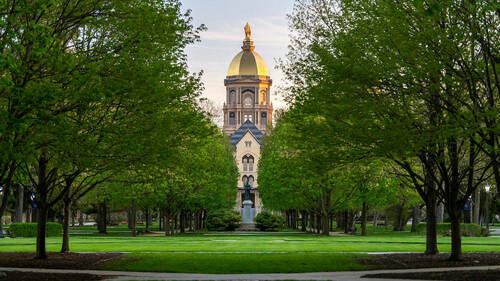
The University of Notre Dame partnered with the United Way of St. Joseph County and Goodwill Industries of Michiana to provide remote tax assistance to low-income individuals and households in the South Bend area while other local tax assistance programs were suspended because of the coronavirus pandemic.
With support from the Mendoza College of Business, Notre Dame Law School Tax Clinic, Notre Dame Research (NDR) and Office of Information Technologies (OIT), the Center for Civic Innovation (CCI) coordinated assistance for 53 taxpayers via the videoconferencing app Zoom and referred another 100 taxpayers to Goodwill for assistance, representing those without access to Zoom or otherwise uncomfortable with the app.
An additional 360 taxpayers declined remote assistance or did not respond to the offer.
All represented taxpayers whose appointments for assistance with the United Way were cancelled because of the coronavirus, which led to lockdowns and other restrictions throughout the spring.
“Overall I think it was highly successful,” said Alisa Zornig Gura, managing director of CCI.
A total of 10 faculty and staff assisted with the effort, including Jay Brockman, director of CCI and professor of the practice in the Department of Computer Science and Engineering, Patrick Thomas, associate clinical professor of law and director of the Tax Clinic, and Ken Milani, professor of accountancy in the Mendoza College of Business.
Thomas and Milani led the Zoom sessions along with Marty Wolfson, professor emeritus of economics at Notre Dame, and a small group of community volunteers, all certified tax preparers.
Laura Kresnak, with the Center for Research Computing, Austin Stewart, with the Notre Dame Turbomachinery Laboratory, and Janet Kenyon, with NDR, worked the phones. Bryan Tanner, director of community investment and public policy for the United Way, and Thomas, Milani, Brockman and Zornig Gura were part of the planning and logistics team. Denise Hock, with OIT, Jen Eggleston, with CCI, Mary Jo Anderson, with the Tax Clinic, along with Thomas and Zornig Gura, were part of the process implementation team.
“It was a learning opportunity for everyone involved,” said Thomas. “Not only us, but the taxpayers too.”
Tanner, with the United Way, said, “The University of Notre Dame team, and their thoughtful approach to aiding low-income and predominantly elderly clients, allowed critical services to be provided during a great time of need.”
Normally, low-income taxpayers have several options for assistance in St. Joseph County.
The United Way operates the Volunteer Income Tax Assistance (VITA) program, an IRS program that provides free assistance to taxpayers who earn $66,000 per year or less, as well as the disabled and limited English-speaking taxpayers. Mendoza, through the Vivian Harrington Gray Notre Dame-Saint Mary’s Tax Assistance Program, offers in-person tax assistance to low- and medium-income individuals and senior citizens in partnership with the St. Joseph County Public Library. The Tax Clinic represents low-income and non-English speaking taxpayers in disputes with the IRS.
Based on this experience, CCI is considering coordinating the same or similar assistance in the future, Zornig Gura said, in the case of this or another public health emergency or for homebound taxpayers.
“I think it would continue to be a good option for those folks who are comfortable with it,” said Thomas. “And we could probably even improve on what we did this time around.”
Part of the College of Engineering, CCI seeks innovative solutions to pressing civic needs, primarily in the South Bend-Elkhart area. Notably, the center manages an internship program for high school and college students based on a community-engaged educational ecosystem model comprised of educational institutions, local government and community organizations.
For more information, visit civicinnovation.nd.edu.
Contact: Erin Blasko, assistant director of media relations, 574-631-4127, eblasko@nd.edu